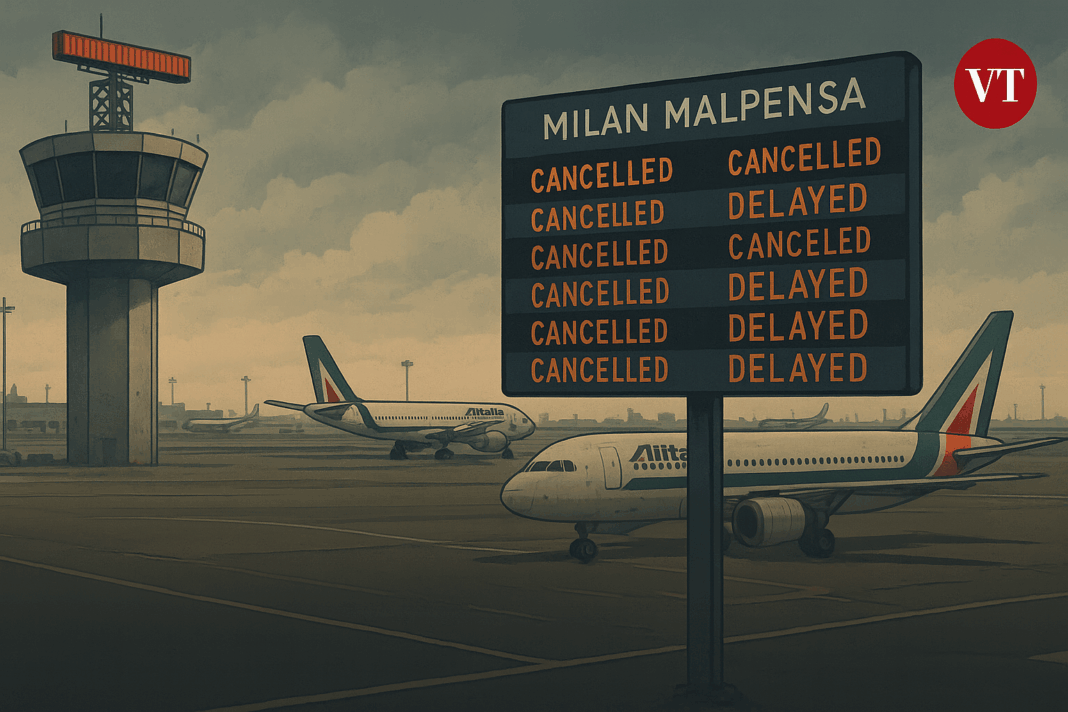Italy becomes the latest country to experience aviation collapse as Milan radar outage disrupts 366 flights
- Italy joins U.S., U.K., India, France, Brazil, and others facing aviation system failures.
- Milan radar blackout paralyzes 366 flights across Malpensa, Bergamo, and Turin.
- Airlines including Ryanair, easyJet, Emirates, and Delta forced to divert or cancel flights.
- Recent incidents reveal fragile digital backbone of global air travel.
- Experts urge urgent modernization of aviation IT and radar infrastructure.
Lead:
Italy has joined a growing list of nations facing aviation chaos due to digital infrastructure failures. On June 29, 2025, a radar and communication outage at Milan’s Area Control Centre grounded 366 flights and halted air traffic across northern Italy, severely disrupting airports in Milan, Bergamo, and Turin, according to a report published by Travel and Trade World)
Italy’s Milan Radar Breakdown Shuts Down Northern Airspace
At around 9:00 PM local time, Milan’s Area Control Centre experienced a critical data transmission failure that disabled radar and voice communication systems. Controllers suspended all takeoffs and landings for nearly two hours, leading to:
- 190 delays and 23 cancellations at Malpensa
- 114 delays and 13 cancellations at Bergamo
- 22 delays and 4 cancellations at Turin
Airlines affected included Ryanair, easyJet, Vueling, ITA Airways, TAP Air Portugal, SAS, Emirates, Delta, and Air France. Passengers faced terminal overcrowding, no communication, and sweltering conditions due to air conditioning malfunctions. Greek passengers on Aegean Airlines flight A3665 were among those stranded without updates or support.
United States – Nationwide Ground Stop and Radar Failures
In January 2023, a corrupted database file crashed the FAA’s NOTAM system, grounding over 32,000 flights. Newark Airport later experienced radar issues in April–May 2025, traced to outdated wiring and aging radar at its TRACON center.
United Kingdom – £100 Million ATC Failure
On August 28, 2023, the UK’s air traffic system collapsed due to a corrupted flight plan. The outage reduced capacity from 400 to 60 flights/hour, grounding over 2,000 flights and affecting 700,000+ passengers. Estimated losses hit £100 million.
Brazil – Communications Outage Paralyzed Airspace
In July 2007, Brazil’s CINDACTA-4 control center suffered a short-circuit, grounding nearly half the country’s flights. The incident marked one of the earliest modern aviation system failures.
France – Radar Glitch at Paris-Orly
In May 2025, a radar failure at Paris-Orly delayed or canceled approximately 130 flights. Controllers briefly lost aircraft positioning, triggering a nationwide alert within France’s airspace.
Philippines – Nationwide Shutdown on New Year’s Day
On January 1, 2023, dual failures in radar and power systems grounded 282 flights. Over 56,000 passengers were stranded as Manila’s ATMC went offline without backup systems.
India – IT Crash Halts Major Airports
During the July 2024 CrowdStrike-linked global IT outage, over 200 flights were grounded in India. IndiGo canceled 192 flights, with airports in Delhi, Mumbai, and Bangalore turning to manual processes amid chaos.
Hong Kong – System Freeze During Global IT Outage
Also in July 2024, Hong Kong International Airport suffered IT meltdowns. Passengers received handwritten boarding passes, and baggage systems failed. Carriers like Cathay Pacific faced hours-long delays.
Czech Republic, Hungary, and Switzerland – Systemic Failures
The same July 2024 outage crippled airport systems in Prague, Budapest, and Zurich. Flights were delayed up to five hours as teams resorted to manual processing across Schengen gateways.
A Fragile Future for Global Aviation
From corrupted databases to aging radar cables, the modern aviation industry is increasingly reliant on fragile digital frameworks. What once ran on robust analog systems is now susceptible to cascading failures from software bugs, infrastructure overload, or even routine maintenance errors.
Italy’s crisis serves as another urgent wake-up call. As global air traffic surges post-pandemic, aviation regulators, airport authorities, and national governments must invest in system resilience. Without redundancies and real-time contingency protocols, these outages risk becoming the “new normal” for global travelers.
(with inputs from Travel and Trade World)
A global media for the latest news, entertainment, music fashion, and more.














